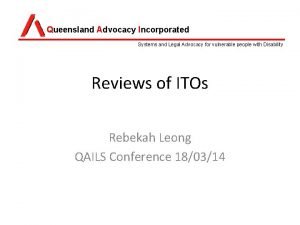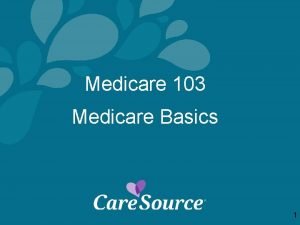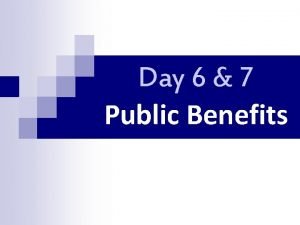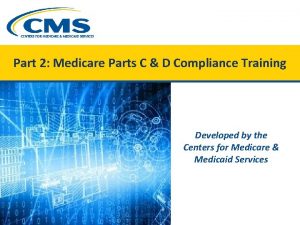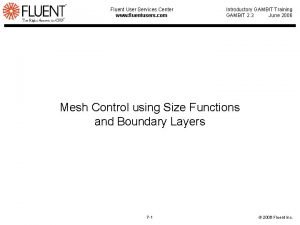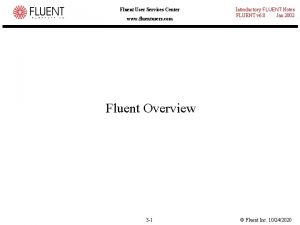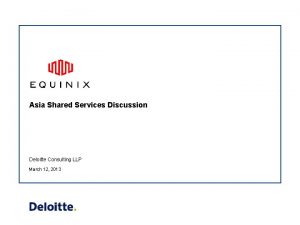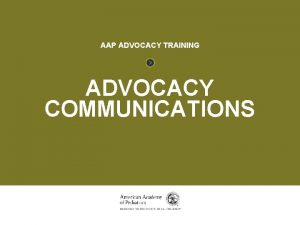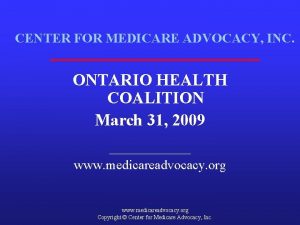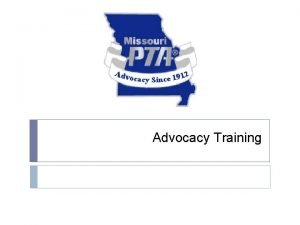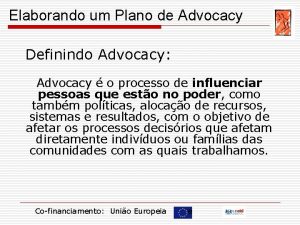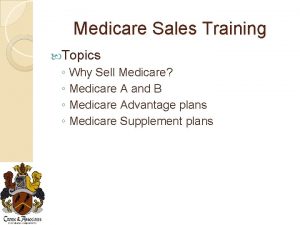CENTER FOR MEDICARE ADVOCACY INC MEDICARE PART D











- Slides: 11

CENTER FOR MEDICARE ADVOCACY, INC. MEDICARE PART D: The Impact on Dual Eligible Beneficiaries Vicki Gottlich, Esq. March 2006 www. medicareadvocacy. org

PART D ISSUES FOR PEOPLE WITH MEDICARE & MEDICAID § Problems caused by random assignment to low-income Part D plans. § Difficulties in accessing medically necessary drugs. § Inability to meet minimal cost sharing requirements. www. medicareadvocacy. org Copyright © Center for Medicare Advocacy, Inc. 2

RANDOM ASSIGNMENT TO PART D PLANS Random assignment results in unequal access caused by variations in coverage of drugs. § OIG Report: • • 1/3 of duals assigned to plans covering less than 85% of 178 most common Part D drugs. Only 18% assigned to plans covering all 178 drugs. § Avalere Health Issue Brief: • • Many California duals have worse coverage than under Medi-Cal (Medicaid). Number of drugs on formularies varies from 530 -3360. www. medicareadvocacy. org Copyright © Center for Medicare Advocacy, Inc. 3

RANDOM ASSIGNMENT TO PART D PLANS Potential gaps in coverage for duals § Issues for duals who change plans: • Between 6 and 18 low-income plans. • Difficulties in determining which plan is “best”. • Communication issues may delay enrollment in new plans. § New duals may lose all drug coverage • • Lose Medicaid when become Medicare eligible. Will they be enrolled in a Part D plan in time? www. medicareadvocacy. org Copyright © Center for Medicare Advocacy, Inc. 4

ACCESS TO MEDICALLY NECESSARY DRUGS § Transitions process issue: • Plans not providing 30 day “first fills” for non • • formulary drugs. CMS’s extension of transition process from 30 to 90 days is voluntary. Enrollees not informed to either get a new prescription or to seek an exception before transition period ends on March 31, 2006. www. medicareadvocacy. org Copyright © Center for Medicare Advocacy, Inc. 5

ACCESS TO MEDICALLY NECESSASRY DRUGS § Exceptions and appeals processes: • • Vary from plan to plan. Exceptions require participation by doctors. • Some doctors charging fees to fill out forms. • • Enrollees may not have sufficient information to pursue appeals. No supply of drugs pending appeal for most duals. § Barriers to switching to formulary drugs • Issues in getting doctors’ appointments. www. medicareadvocacy. org Copyright © Center for Medicare Advocacy, Inc. 6

INABILITY TO MEET COST SHARING REQUIREMENTS § Duals pay co-payments of $0 -$5/drug depending on income level, residence. • • • Cost sharing obligations new for some duals. Cost sharing could be waived under Medicaid but not under Medicare. Cost sharing amounts to be indexed yearly. § Medicaid does not wrap around Part D benefit. • • Unlike for other Medicare services, Medicaid doesn’t pick up cost sharing. States vary in Medicaid coverage for Part D excluded drugs. www. medicareadvocacy. org Copyright © Center for Medicare Advocacy, Inc. 7

INABILITY TO MEET COST SHARING REQUIREMENTS § Institutionalized duals have no cost sharing. § Duals who live in assisted living, board & care facilities are not institutionalized. • Pay all but small amount of their income to • facility for care. Must pay co-payments – costs often exceed personal needs allowance. www. medicareadvocacy. org Copyright © Center for Medicare Advocacy, Inc. 8

RECOMMENDATIONS § Increase funding to organizations that assist individual beneficiaries. § Assign duals to plans whose formularies match their needs- “intelligent random assignment. ” § Simplify Part D by standardizing • • • benefit packages transition policies exceptions and appeals processes. www. medicareadvocacy. org Copyright © Center for Medicare Advocacy, Inc. 9

RECOMMENDATIONS § Eliminate cost-sharing for all duals receiving long-term care services, regardless of setting. § Allow Medicaid to “wrap around” Part D. § Ensure seamless transition from Medicaid to Medicare drug coverage. § Add a drug benefit to traditional Medicare. www. medicareadvocacy. org Copyright © Center for Medicare Advocacy, Inc. 10

CENTER FOR MEDICARE ADVOCACY, INC. MEDICARE PART D: The Impact on Dual Eligible Beneficiaries For continually updated information go to www. medicareadvocacy. org
 Queensland advocacy incorporated
Queensland advocacy incorporated Foothills child advocacy center
Foothills child advocacy center Medicare part d covers
Medicare part d covers Downstream entity examples
Downstream entity examples Medicare part d covers
Medicare part d covers Medicare part d covers
Medicare part d covers Cd compliance
Cd compliance Cvs medicare part b module answers
Cvs medicare part b module answers D'leon inc part 1 solution
D'leon inc part 1 solution Fluent user services center
Fluent user services center Fluentusers.com
Fluentusers.com Deloitte shared services conference 2016
Deloitte shared services conference 2016
